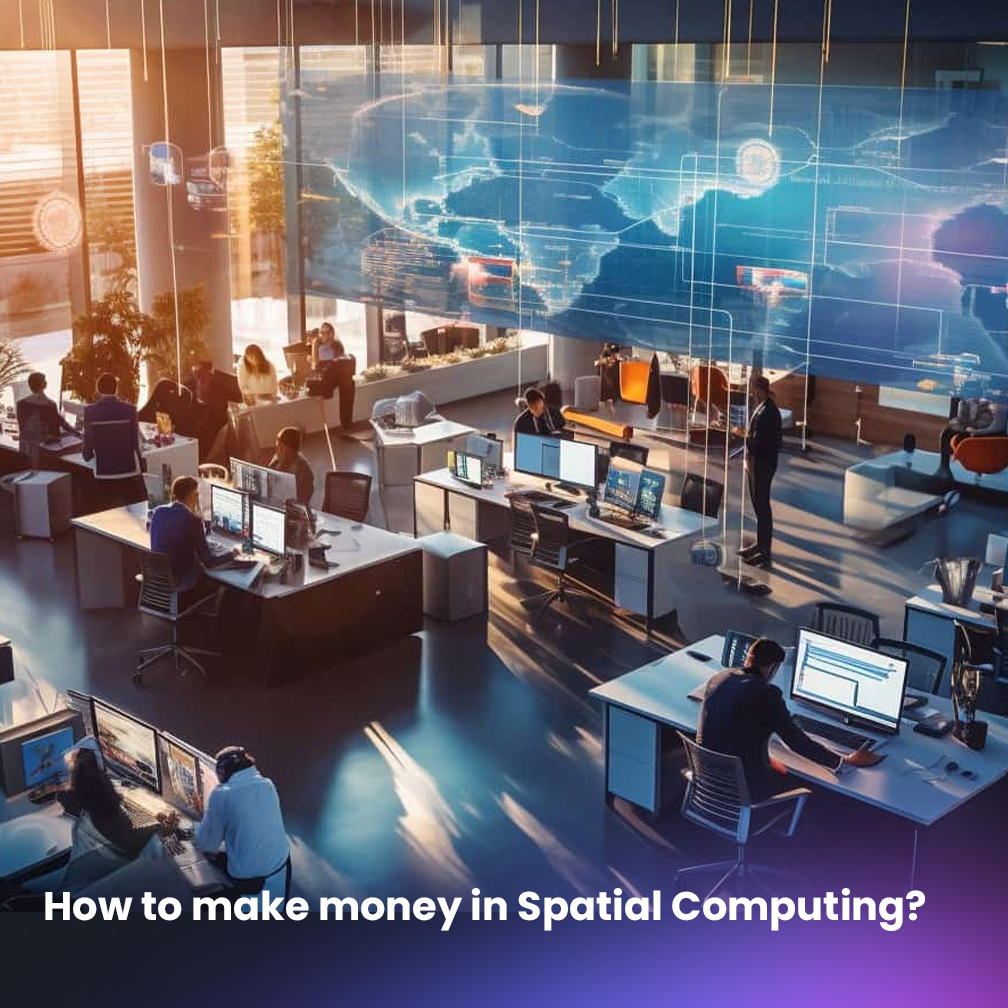What is Digital Real Estate in 2023 and Why You Should Care

Estimated reading time: 8 minutes
If you’ve been hearing about “digital real estate” but are unsure about what it entails, you’re not alone. This emerging concept of virtual property has been generating buzz among tech enthusiasts and investors alike. However, for many, comprehending digital land can seem as daunting as understanding quantum physics.
But fear not! In this comprehensive guide, we will unravel the complexities of digital real estate, shedding light on its significance and potential opportunities, even for those unfamiliar with advanced technology. So, let’s dive into the fascinating world of digital property and make sense of it together!
Table of contents
- Digital Land 101
- Ownership and Investment in Digital Land
- Developing Your Digital Digs
- Valuable Property Powered by Blockchain
- Key Considerations for Potential Investors
- Is Digital Real Estate Right for You?
- Exciting Times Ahead in Spatial Computing
- Platforms Opening Virtual Worlds
- Staying Safe in Spatial Computing
- The Future of Digital Real Estate
Digital Land 101
To begin with, let’s envision the internet as a vast virtual planet. Within this digital realm, individual websites serve as distinct plots of land that users can explore. These virtual properties collectively form the expansive landscape of the internet that we navigate daily.
Now, imagine transcending from individual websites to immersive 3D virtual worlds akin to those found in video games. Similar to the internet, these virtual domains are divided into digital parcels of land, each uniquely identifiable by its coordinates.
It is within these virtual parcels of land that the concept of “digital real estate” comes into play. Remarkably, individuals can purchase and own digital land much like physical properties, albeit existing solely in the virtual realm. Despite their virtual nature, owning and developing digital properties present tangible opportunities to generate real income—a topic we’ll delve into shortly.
Ownership and Investment in Digital Land
Understanding how ownership functions in the digital real estate realm is key. In many ways, it mirrors traditional property ownership.
Just as one can purchase vacant lots in the physical world, individuals can acquire land parcels within spatial and other virtual environments. What’s unique is that these transactions are recorded via blockchain technology, with ownership certificates stored in digital wallets, replacing traditional paper titles with futuristic digital deeds.
As the sole owner of a virtual land parcel, you wield exclusive rights to access, modify, and monetize that specific plot. Whether it’s within platforms like Cryptovoxels, Decentraland, or others, blockchain technology ensures indisputable ownership.
Much like real-world properties, prime digital real estate in sought-after locations commands significant value. For instance, the sale of a parcel in Decentraland’s thriving fashion hub reached a record-breaking $2.4 million. This underscores the importance of location even in virtual landscapes.
Developing Your Digital Digs
One of the most exciting aspects of digital real estate is the ability to develop and monetize your virtual holdings akin to building your empire in a simulation game.
Most spatial platforms offer extensive creative freedom, allowing landowners to bring their imaginative visions to life. Whether you envision a digital storefront for selling digital art, a vibrant virtual nightlife venue, an interactive advertising space, or even a fully-fledged casino, the possibilities are virtually limitless.
Some platforms, such as The Sandbox, streamline the development process by enabling users to create interactive experiences or games without necessitating advanced coding skills. This accessibility makes building and monetizing digital assets more attainable for a broader audience.
Beyond property development, landowners can generate revenue through various avenues such as renting out advertising space, charging access fees for immersive experiences, selling virtual merchandise, and exploring innovative monetization strategies unique to the digital realm.
Valuable Property Powered by Blockchain
So, why the fervor surrounding digital real estate? The answer lies in its potential value and the underlying technologies driving its growth.
The scarcity of digital land in popular spatial environments coupled with the transparency and security offered by blockchain technology has spurred unprecedented demand. Tech titans, investors, and enthusiasts alike are pouring billions into virtual property, recognizing its transformative impact and wealth-generating potential.
The meteoric rise of non-fungible tokens further accentuates the value proposition of digital real estate. These unique digital assets, authenticated and verified on the blockchain, serve as the cornerstone of digital land ownership within spatial environments. They not only validate ownership but also grant exclusive access to virtual assets ranging from land and avatars to virtual clothing and accessories.
Key Considerations for Potential Investors
While the allure of digital real estate is undeniable, prospective investors should approach this emerging asset class with careful consideration. Here are a few key factors to weigh:
- Motivation and Strategy: Understand your motivations for investing in digital real estate. Is it purely speculative, driven by a passion for spatial technologies, or a blend of both? Align your investment strategy with your goals and risk tolerance.
- Risk Assessment: Like any investment, digital real estate carries inherent risks, particularly given the volatility of cryptocurrencies and the nascent stage of virtual property markets. Only invest what you can afford to lose and conduct thorough research.
- Market Research: Familiarize yourself with major spatial platforms, track land sales trends, study factors influencing value appreciation, and stay informed about market dynamics. Informed decisions are crucial in navigating this evolving landscape.
- Start Small and Diversify: Begin with smaller, affordable land parcels to gain hands-on experience and insights into the market. Diversify your investment portfolio to mitigate risk and avoid overexposure to a single asset class.
- Long-Term Perspective: Emphasize long-term growth potential over short-term gains. While virtual worlds are still in their infancy, their transformative impact could yield substantial returns for patient investors.
- Stay Informed: Continuously educate yourself about emerging trends, technological advancements, and regulatory developments shaping the digital real estate market. Adaptability and knowledge are key to navigating this dynamic ecosystem.
Is Digital Real Estate Right for You?
If you’re considering diving into digital real estate, it helps to assess if it aligns with your broader investing strategy and risk tolerance. Here are a few key considerations:
Know Your Motivation
What’s drawing you to digital land? Is it purely speculative, a passion for spatial tech, or a bit of both? How it aligns with your other investments and interests is key.
Understand the Risks
All investing carries risks, and the volatility and uncertainty of cryptocurrencies and spatial real estate ups the ante. Only invest what you can afford to lose.
Do Your Research
Don’t jump in blind! Study the major spatial platforms, track land sales, learn the factors that drive value appreciation, and research the risks. Get smart beforehand.
Start Small
You don’t have to snag an entire estate on day one! Try buying a small, affordable parcel first to test the waters and learn the landscape. Crawl before you ball out.
Look Long Term
This is bleeding-edge stuff, so expect unpredictability. But virtual worlds are still in their infancy. Focus on long-term potential rather than get-rich-quick dreams.
Diversify Your Portfolio
Balance digital real estate with other assets you understand well. Never over-invest in one asset class, no matter how hot the buzz.
Weighing these key aspects will determine if diving into digital land aligns with your financial situation. Never forget the basics of smart investing!
Exciting Times Ahead in Spatial Computing
Spatial Computing promises exciting possibilities that could dwarf today’s social networks and entertainment. With so much potential value being created, getting involved on the ground floor might just be a historical opportunity.
Of course, you must assess if the risk and learning curves make sense for your situation. But somewhere down the line, you may regret not planting your flag in this strange new digital frontier.
Do you still think the idea of digital land is ridiculous? Skeptics doubted domain names and websites too. Now they’re billion-dollar assets!
The choice is yours. But the future won’t wait – better stake your claim soon before all the prime virtual real estate gets snatched up!
Ready to make (virtual) real estate history? The portal to spatial computing awaits. Step through and start your journey to becoming the next mogul of the digital world!
Platforms Opening Virtual Worlds
Several key platforms are pioneering spatial technology and fueling the digital land rush. The biggest players include:
Decentraland – Fully user-created 3D virtual world allowing buying and selling of digital land assets. It runs on the Ethereum blockchain.
The Sandbox – Developers and players can create 3D voxel worlds and game experiences using blockchain-based digital assets.
Cryptovoxels – Virtual world on the Ethereum blockchain where users can buy land parcels as digital assets and open stores and art galleries.
Somnium Space – An open, social VR world where users can buy and trade virtual land and customize avatars.
Others – Additional platforms like Voxels, Axie Infinity, Illuvium, Star Atlas and more are part of the expanding open spatial universe.
As these virtual worlds grow, we expect digital real estate on leading platforms to appreciate substantially due to first-mover advantage.
Staying Safe in Spatial Computing
Like any online space, spatial computing comes with risks around privacy, data collection, toxic behavior, and scams. Users must take steps to protect themselves:
- Use unique avatar names and be cautious sharing personal details
- Enable security options provided by platforms like two-factor authentication
- Be wary of “too good to be true” land deals or investment opportunities
- Report abusive behavior and block/mute provocative users
- Use common sense around what you share and do in virtual worlds
Positive community standards will be essential for making spatial computing welcoming and safe for all. Personal responsibility also goes a long way.
The Future of Digital Real Estate
As we venture further into the open spatial computing era, the landscape of digital real estate will continue to evolve, presenting both opportunities and challenges. While uncertainties persist, early adopters and strategic investors stand to gain invaluable experience and potentially lucrative returns.
Spatial computing’s growing influence across social interactions, entertainment, commerce, and beyond underscores the significance of digital real estate as a pivotal asset class within this burgeoning ecosystem. As virtual worlds mature and integrate with our daily lives, the value proposition of owning digital land may transcend novelty to become a cornerstone of digital wealth and influence.
So, are you ready to embark on this digital frontier and stake your claim in the spatial web? The possibilities are boundless, and the journey promises to be both thrilling and transformative. Step into Spatial Computing, and let the adventure begin!








